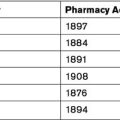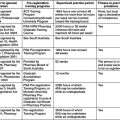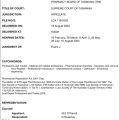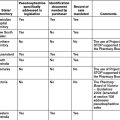Chapter 6 Pharmacy ownership
INTRODUCTION
In a number of jurisdictions, pharmacies may also be owned by friendly societies. A friendly society is composed of a body of people who join together for a common purpose. Before the availability of insurances and the development of the so-called welfare state, friendly societies played an important role in people’s lives, providing a range of financial and social services not otherwise available to individuals. One area where traditionally friendly societies have been active is in the field of health; in Australia (and New Zealand) this translated into pharmacy ownership. Although the importance of friendly societies is somewhat diminished in contemporary Australian society, the ownership of pharmacies by friendly societies is still reflected in much of the current legislation governing pharmacy practice.
NATIONAL COMPETITION POLICY REVIEW OF PHARMACY
A national review of state/territory pharmacy legislation and certain provisions of Commonwealth legislation relating to the Pharmaceutical Benefits Scheme (PBS) and the National Health Act 1953 (Cth) was conducted by Warwick Wilkinson under the National Competition Policy systematic legislative review process.[1]
Recommendation 5 related to friendly societies and supported the removal of any regulations specific to the establishment of friendly society pharmacies that do not also apply to other proprietors. While Recommendation 6 supported the retention of regulations restricting non-pharmacists from having a direct proprietorial interest in community pharmacies, it did propose at Recommendation (6)(c)(3) that any regulations that prevented commercial considerations for third parties based on a pharmacy’s turnover or profit be removed. Recommendation 7 supported the removal of legislative requirements for the registration of pharmacy premises and the registration of pharmacy businesses (subject to provisions) as the review could see no public benefit in their retention. Recommendation 8 required that legislation relevant to the delivery of pharmacy services provided for an acceptable range of services, and appropriate quality assurance and professional practice standards be adopted by community pharmacies.
STATE AND TERRITORY OWNERSHIP ARRANGEMENTS
Australian Capital Territory
Pharmacy ownership is prescribed in the Health Professional Regulation 2004 (the Regulation).
A pharmacy, which is defined as a premises where a pharmacist practises pharmacy, may be owned by a pharmacist or a corporation practising as a pharmacist. Such a corporation must have the Pharmacy Board’s written approval to practise and have a constitution that is appropriate to a corporation approved to practise as a pharmacy (s5.6). There are no limits in the Act with regard to the number of pharmacies that can be owned by a pharmacist or a corporation practising as a pharmacist.
Northern Territory
It is worthy of note that the Act differentiates between a ‘pharmacy business’ which means ‘… a business that includes the custody of drugs and medicines, the dispensing of medicines on prescription and the supply of scheduled drugs and poisons to consumers by retail …’ and a ‘pharmacy service’ which means ‘… a service that includes the custody of drugs and medicines, the dispensing of medicines on prescription and the supply of scheduled drugs and poisons to patients and consumers …’. Only ‘authorised pharmacy service providers’ can own a pharmacy service. An ‘authorised pharmacy service provider’ is an organisation that operates either an Aboriginal health service, a pharmacy service that is part of a public hospital, or a pharmacy service that is part of a defence force facility.
South Australia
The ownership provisions in South Australia are prescribed in the Pharmacy Practice Act 2007 (the Act).
Victoria
The ownership provisions in Victoria are prescribed in Part 6 of Health Professions Registration Act 2005. Ownership of a pharmacy business is restricted to pharmacists registered with the Pharmacy Board or corporations registered under the Corporations (Victoria) Act 1990 (Vic) where all the directors and shareholders are registered pharmacists and where all the shares and beneficial and legal interest in the shares are held by registered pharmacists, or a company registered under the Corporations (Victoria) Act 1990 (Vic) as a friendly society (subject to a number of additional conditions).






